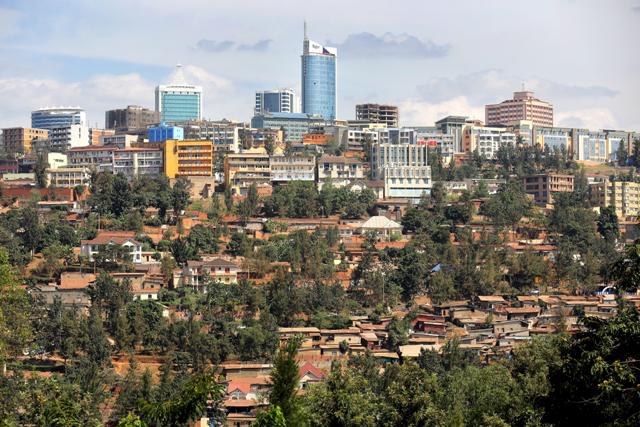 Kigali is the venue for the next Commonwealth Heads of Government Meeting, postponed in 2020 and in June 2021. [photo: Kigali skyline, Alamy]
Kigali is the venue for the next Commonwealth Heads of Government Meeting, postponed in 2020 and in June 2021. [photo: Kigali skyline, Alamy]
[This is an excerpt from an article in The Round Table: The Commonwealth Journal of International Affairs. Opinions expressed do not reflect the position of the Round Table Editorial Board.]
Commonwealth values should be applied at ground and grass roots level. The Commonwealth represents the world’s second largest organisation after the UN in terms of both membership (2.4 billion people, a third of the world’s population) and area (about 21% of the world’s total land area). The Commonwealth Charter recognises its member states as ‘free and equal’. From Canada to Australia, from India to South Africa, from Nigeria to the United Kingdom, the Commonwealth commands huge resources. And yet, the richer nations continue to be rich and the poor continue to be impoverished. Rwanda, with its recent tragic history, though determined to eradicate poverty and establish sustainable human dignity, can only achieve these goals through genuine cooperation.
Sharing resources is about more than money and technologies. The evolving conversations on democracy, human rights, peace and security, rule of law, protection of the environment, gender equality, the importance of young people and citizen participation are all important issues for Rwandans. Despite its wounded history, Rwanda has a story and narrative to tell. Moving from what many considered a ‘failed state’ to state and nation building, peace and reconciliation, Rwanda has built a successful model resourcing home-grown solutions for governance and the rehabilitation of social, cultural, economic and political fabrics. Rwandans want the Commonwealth summit to be more than a diplomatic and political classroom where the most influential nations give lessons; instead, they hope for ‘equal partners’ listening and learning from each other and committing to active solidarity.
When Rwanda joined Commonwealth in 2009, it adopted English as the third official language (after Kinyarwanda and French); the government had just legislated, in 2008, for English as sole language of instruction at all levels of education. The implementation of this policy started in January 2009 although most teachers in service were educated only in French and/or Kinyarwanda. Teaching English remains a sharp challenge facing the education sector, and yet the British Council in Rwanda has withdrawn most of its support for related activities.
The Commonwealth Charter claims to stand for smaller and vulnerable states (principles 14 and 15) and for promoting access to health, education, food and shelter (principle 11). All these have been tested by the COVID-19 pandemic. What the Prime Minister of the UK, Boris Johnson, called ‘greed of richer nations’ starts with the UK itself. Strengthened by huge financial, scientific and technological advances, the UK and wealthier nations have produced vaccines and rolled out mass vaccination, whilst impoverished countries still dream of the first jab. Rwanda took radical prevention strategies; and yet it was maintained on the UK red travel list. It may be that the issues are being discussed through diplomatic channels. But what matters most today is building the capacity of Africans for a breakthrough in research and technologies that would produce vaccines and medicine against COVID-19 and other existing diseases and pandemics. The African Union heads of states set up a strategic plan. The Commonwealth might be expected to share scientific knowledge, technology and financial investments for a revolution to happen, in Africa, as the West did with Asian countries long ago.
Rwanda has been commended by international financial institutions for initiating reforms that made it the second-best place to do business in Africa. It championed the African Free Trade Agreement (AFCFTA) which came into force on 1 January 2021. This Agreement is bolstering the Single African Air Transport Market (SAATM), launched in 2018, to develop and harmonise air services and associated regulations to stimulate private capital in the industry. Rwanda has invested hugely in the hospitality industry combining conservation and preservation of the environment and parks with world class hotels, air and land transport facilities and modernising internet connectivity. Now, Rwanda seeks significant partnerships within the Commonwealth.
Tharcisse Gatwa is a Research Consultant with the Protestant Institute of Arts and Social Sciences, Butare, Rwanda.
Related article:
CHOGM 2009: The year Rwanda joined the Commonwealth – Commonwealth Diary (free access from the archives until 3 August 2021).



